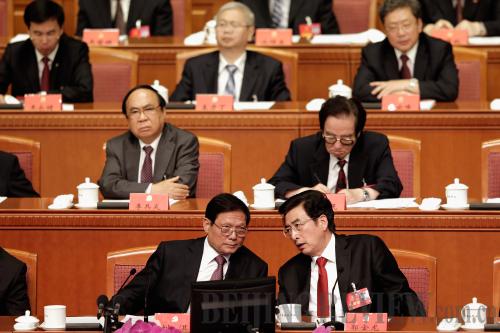|
 |
|
NEW LEADER: Beijing Mayor Guo Jinlong (front right) was elected as the new chief of the Beijing Municipal Committee of the Communist Party of China on July 3 (ZHANG LINTAO) |
With the conclusion of the 11th Beijing Municipal Congress of the Communist Party of China (CPC) on July 3, China has completed the reshuffling of its Party leaders at the provincial-municipal level.
Out of 31 provinces, autonomous regions and municipalities, Beijing is the last to reshuffle its municipal Party committee, after the Liaoning Provincial Party Committee took the lead in October last year.
China began to reshuffle its Party committee secretaries and members of the Party committees at township, county, city and provincial levels last year.
Along with the changes of local Party committees, delegates are also elected to attend the coming 18th CPC National Congress later this year. Sixty-four delegates of Beijing were elected during the 11th Beijing Municipal Congress of the CPC.
Before Beijing, 28 out of the 40 electoral units for the national congress have finished the elections, including 24 provincial units and four units at the central government level.
A total of 2,270 delegates are elected from 82.4 million CPC members by 40 electoral units across the country. The number is 50 more than that to the 17th National Congress of the CPC five years ago.
The delegates are required to be Party members with outstanding political performance and have close ties with society, according to the CPC Central Committee.
A well-educated party
On June 30, the Organization Department of the CPC Central Committee released a statement, saying that the number of CPC members surpassed 82.6 million in 2011, up 2.9 percent from 2010.
In 2011, some 3.16 million out of 21.6 million applicants were accepted to join the CPC, according to the statement.
"The Party has been drawing more members from the forefront of business and production, and the performance of Party members is improving," the statement said.
According to official figures, the number of female Party members is 19.25 million, accounting for 23.3 percent of the total. Members of ethnic minorities amount to 5.56 million, or 6.7 percent.
Meanwhile, among all members, 38.6 percent received education in a junior college or above, while 25 percent are below age 35.
Students and government employees are two major contributors to the rise in the number of Party members, said Lin Zhe, a professor with the Party School of the CPC Central Committee.
"Most colleges and universities encourage students to apply for Party membership while the reasons for more students joining the Party vary. Some do have a strong belief and take pride in the Party, but others join out of personal concerns, hoping that the Party membership can give them leverage in the job market," Lin said.
There are a total of 2.77 million student Party members. A large number of well-educated young people are joining the Party.
People from different professions, especially workers and people with privately-owned enterprises, are showing a stronger will to join the Party than before, Lin said.
"Party members are playing a leading role in all walks of life. Many of them have proven to be good examples for the public, and they have the ability to call on public support in major events, such as relief efforts during disasters," said Lin, adding that more foreign-invested corporations are seeing the positive influence brought by employees who are Party members and many foreign companies in China have set up their own CPC organizations.
The number of CPC organizations at the grassroots level totaled 4.02 million by 2011, a 3.5-percent increase over 2010, according to the statement.
Party organizations have covered almost all publicly-owned enterprises and public service units, official data shows, and 983,000 non-public-owned enterprises and more than 200,000 social groups had established their own CPC organizations by 2011.
Some 44 percent of non-public-owned enterprises in Beijing, including foreign-invested and privately owned companies, had established their own CPC organizations by 2012, a drastic increase over 5.26 percent in 2006, according to a report by China News Weekly.
Prelude to the congress
The latest reshuffle of Party leaders, which produced 404 leadership members for the CPC standing committees in 31 provinces, municipalities and autonomous regions on the Chinese mainland, brought many younger and better-educated officials onboard.
| 